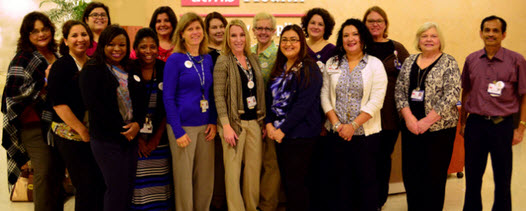
 When you hear the word social worker what comes to mind? Do you envision a government employee who makes visits to people’s homes who are in crisis? Do you think of a person who has someone’s child placed in child protective services?
When you hear the word social worker what comes to mind? Do you envision a government employee who makes visits to people’s homes who are in crisis? Do you think of a person who has someone’s child placed in child protective services?
“That’s the biggest misconception people have about social workers,” said Amy Barrera-Kovach, licensed master social worker at UTMB Galveston campus. “They think that we get involved in people’s lives when something bad has happened.”
However, I quickly learn that is far from the case, when I sit down with Barrera-Kovach for a sneak peek into the work life of a social worker.
According to the National Association of Social Workers, social workers help individuals, families and groups restore or enhance their capacity for social functioning, and at UTMB they work as advocates for our clinical and hospital patients and families.
“We help advocate for and educate individuals in a crisis situation or those who are simply overwhelmed and need direction,” said Barrera-Kovach.
Patients can be referred to UTMB’s social workers by doctors and nurses for a variety of needs, including assistance with finding a home health-care provider, housing, food and counseling.
UTMB social workers sometimes do have to make referrals to child protective services or adult protective services when abuse is suspected, but those are not the majority of cases they see.
“They may just need counseling or a referral, but my job is to empower them to reach their goal,” Barrera-Kovach said.
Her day of empowerment began in her office at 8 a.m. at UTMB’s Island East Family Medicine Clinic in Galveston, where she started her day by following-up on patient referrals. On any given day she may receive up to 10 referrals.
This morning she makes calls for a diabetic patient from our Dickinson clinic who needs physical and occupational therapy. She contacts home health-care agencies that will bring therapists into the patient’s home to deliver care.
“Many patients and families just don’t know where to turn when they are in need of services like these,” said Barrera-Kovach. “To me it’s a small thing I do to help them, but it means the world to them to get the assistance.”
By 11 a.m. Barrera-Kovach has followed up on five different cases, before receiving a walk-in patient. It’s a woman looking for an assisted-living facility for her elderly father who can no longer live alone.
Next she goes back to her computer and phone to continue to make calls on the behalf of UTMB patients. By 2 p.m. she’s helped three more patients receive home health care and put a couple one step closer to starting a family of their own through adoption.
She’s not taking away children, she’s helping find them.
 Next, she visits with patient Rita West who needs a vital medical supply, an oxygen tank. West has also received assistance from Barrera-Kovach in getting a discount on a prescription drug that was too expensive for the senior.
Next, she visits with patient Rita West who needs a vital medical supply, an oxygen tank. West has also received assistance from Barrera-Kovach in getting a discount on a prescription drug that was too expensive for the senior.
“It’s nice to have someone you can call when you have issues,” said West. “She’s an advocate.”
After helping West, Barrera-Kovach shares more on her profession.
“I’m an outpatient social worker so I sometimes go out and make home visits,” she said. “I had a patient who was referred to me because he had missed several doctor’s appointments.”
Upon calling the patient she discovered he was without a car and his Social Security benefits check had been stolen, so he was also without food. “He was crying on the phone and I had just purchased groceries earlier that day that were still in my car,” she said.
Barrera-Kovach was so moved by the patient’s emotional state that she took her groceries to his home and helped him get assistance with public transportation.
“This job has helped me to learn to count my blessings,” she said. “Sometimes  we’re worried about what shoes to wear and there are others who may not have a pair of shoes.”
we’re worried about what shoes to wear and there are others who may not have a pair of shoes.”
That’s one of the last things Barrera-Kovach says to me before I leave her. She’ll spend the remainder of her day on the phone empowering more patients and advocating for their well-being.
“I truly feel like I’m fulfilling the UTMB vision statement of working together to work wonders, because the doctors and nurses have only so much time to spend with the patients and their families,” she said. “I’m able to hold their hand and help them when life gets overwhelming.”
And for that we thank you. And that’s a day in the life of a social worker.
Barrera-Kovach is the social worker for UTMB’s Island East Family Medicine, Dickinson Family Medicine and Island West Family Medicine clinics, where she is also facilitator for their Patient and Family Advisory Board. She is also a 2014 President’s Cabinet Award recipient. March is National Professional Social Work Month, and Barrera-Kovach is just one example of the many hard-working social workers serving the patients and families of UTMB.